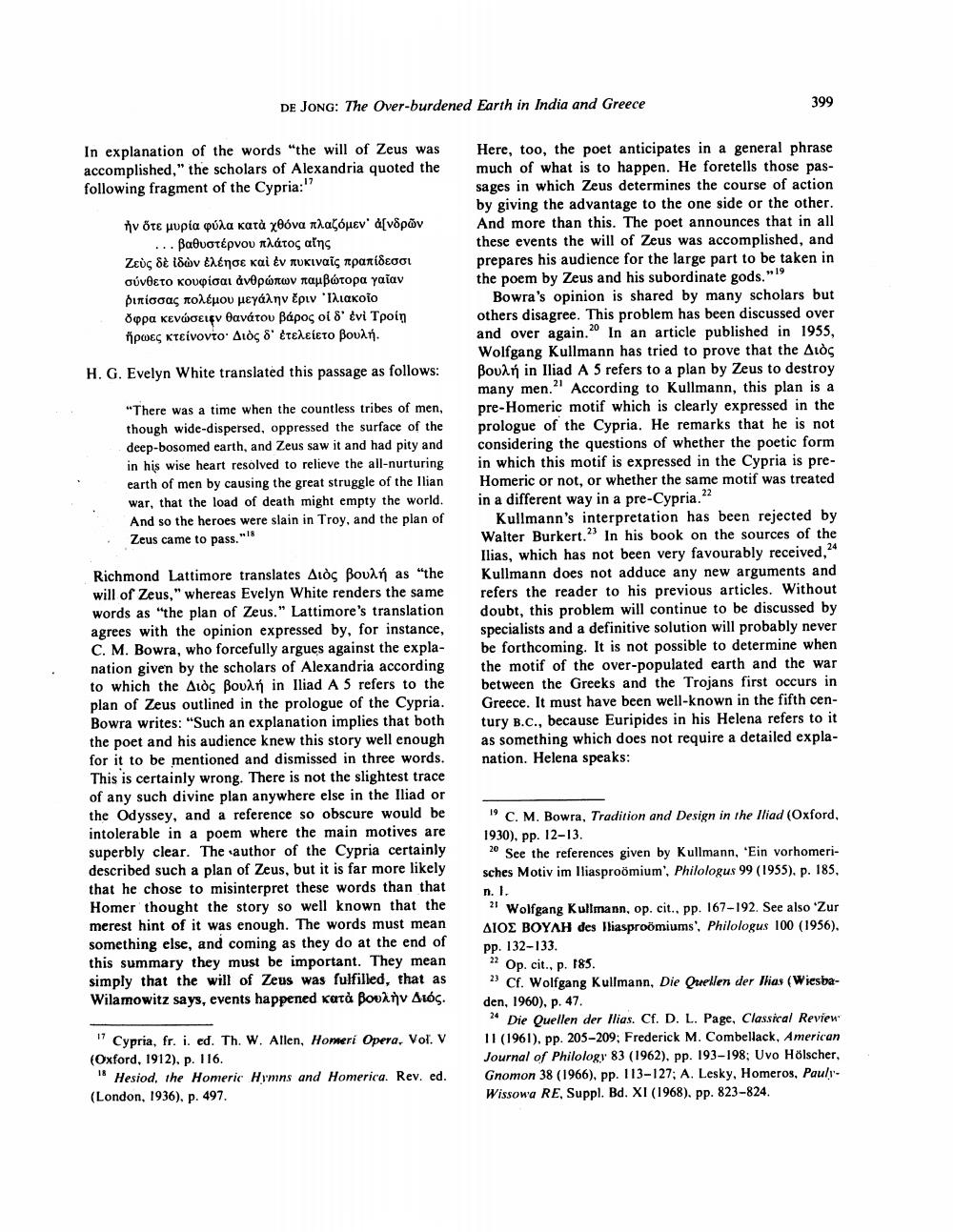________________
DE JONG: The Over-burdened Earth in India and Greece
In explanation of the words "the will of Zeus was accomplished," the scholars of Alexandria quoted the following fragment of the Cypria:"
ἦν ὅτε μυρία φύλα κατὰ χθόνα πλαζόμεν' ἀ[νδρῶν . . . βαθυστέρνου πλάτος αἴης
Ζεὺς δὲ ἰδὼν ἐλέησε καὶ ἐν πυκιναῖς πραπίδεσσι σύνθετο κουφίσαι ἀνθρώπων παμβώτορα γαῖαν ῥιπίσσας πολέμου μεγάλην ἔριν ̓Ιλιακοῖο ὄφρα κενώσειςν θανάτου βάρος οἱ δ ̓ ἐνὶ Τροίῃ ἥρωες κτείνοντο· Διὸς δ' ἐτελείετο βουλή.
H. G. Evelyn White translated this passage as follows:
"There was a time when the countless tribes of men, though wide-dispersed, oppressed the surface of the deep-bosomed earth, and Zeus saw it and had pity and in his wise heart resolved to relieve the all-nurturing earth of men by causing the great struggle of the Ilian war, that the load of death might empty the world. And so the heroes were slain in Troy, and the plan of Zeus came to pass."18
Richmond Lattimore translates Atòç Bouλn as "the will of Zeus," whereas Evelyn White renders the same words as "the plan of Zeus." Lattimore's translation agrees with the opinion expressed by, for instance, C. M. Bowra, who forcefully argues against the explanation given by the scholars of Alexandria according to which the Atos Bouλn in Iliad A 5 refers to the plan of Zeus outlined in the prologue of the Cypria. Bowra writes: "Such an explanation implies that both the poet and his audience knew this story well enough for it to be mentioned and dismissed in three words. This is certainly wrong. There is not the slightest trace of any such divine plan anywhere else in the Iliad or the Odyssey, and a reference so obscure would be intolerable in a poem where the main motives are superbly clear. The author of the Cypria certainly described such a plan of Zeus, but it is far more likely that he chose to misinterpret these words than that Homer thought the story so well known that the merest hint of it was enough. The words must mean something else, and coming as they do at the end of this summary they must be important. They mean simply that the will of Zeus was fulfilled, that as Wilamowitz says, events happened κατὰ βουλὴν Διός.
17 Cypria, fr. i. ed. Th. W. Allen, Homeri Opera, Vol. V (Oxford, 1912), p. 116.
18 Hesiod, the Homeric Hymns and Homerica. Rev. ed. (London, 1936), p. 497.
399
Here, too, the poet anticipates in a general phrase much of what is to happen. He foretells those passages in which Zeus determines the course of action by giving the advantage to the one side or the other. And more than this. The poet announces that in all these events the will of Zeus was accomplished, and prepares his audience for the large part to be taken in the poem by Zeus and his subordinate gods."19
21
Bowra's opinion is shared by many scholars but others disagree. This problem has been discussed over and over again.20 In an article published in 1955, Wolfgang Kullmann has tried to prove that the Atoc Bouλn in Iliad A 5 refers to a plan by Zeus to destroy many men. According to Kullmann, this plan is a pre-Homeric motif which is clearly expressed in the prologue of the Cypria. He remarks that he is not considering the questions of whether the poetic form in which this motif is expressed in the Cypria is preHomeric or not, or whether the same motif was treated in a different way in a pre-Cypria.22
Kullmann's interpretation has been rejected by Walter Burkert.23 In his book on the sources of the Ilias, which has not been very favourably received,24 Kullmann does not adduce any new arguments and refers the reader to his previous articles. Without doubt, this problem will continue to be discussed by specialists and a definitive solution will probably never be forthcoming. It is not possible to determine when the motif of the over-populated earth and the war between the Greeks and the Trojans first occurs in Greece. It must have been well-known in the fifth century B.C., because Euripides in his Helena refers to it as something which does not require a detailed explanation. Helena speaks:
19 C. M. Bowra, Tradition and Design in the Iliad (Oxford, 1930), pp. 12-13.
20
See the references given by Kullmann, 'Ein vorhomerisches Motiv im Iliasproömium', Philologus 99 (1955), p. 185, n. 1.
21
Wolfgang Kullmann, op. cit., pp. 167-192. See also 'Zur AIOE BOYAH des Iliasproömiums', Philologus 100 (1956). pp. 132-133.
22
Op. cit., p. 185.
23 Cf. Wolfgang Kullmann, Die Quellen der Ilias (Wiesbaden, 1960), p. 47.
Die Quellen der Hias. Cf. D. L. Page, Classical Review 11 (1961), pp. 205-209; Frederick M. Combellack, American Journal of Philology 83 (1962), pp. 193-198; Uvo Hölscher, Gnomon 38 (1966), pp. 113-127; A. Lesky, Homeros, PaulyWissowa RE, Suppl. Bd. XI (1968), pp. 823-824.




